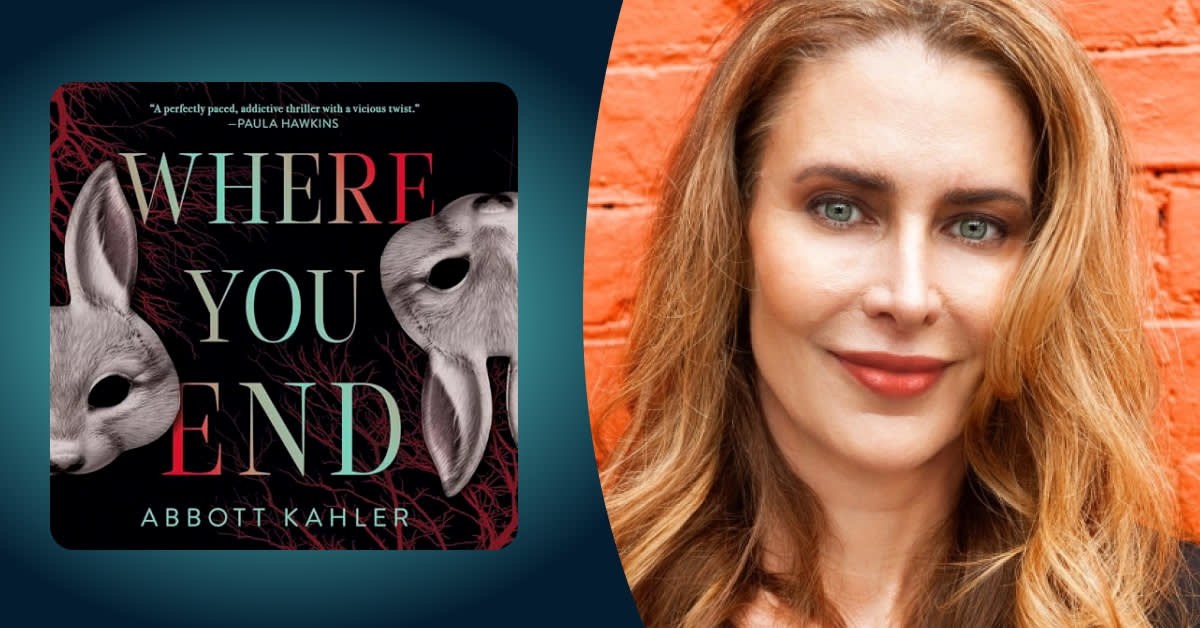Where You End tells the story of identical twins Jude and Kat Bird after an accident leaves Kat without memory of anything besides her sister upon waking from a coma. When Jude decides to re-create a more positive life for Kat within her memories, it only leads to further questions and dangers as both are aware that you can’t outrun your past, even if you don’t remember it. Inspired by true events, Abbott Kahler spins a shocking mystery that will leave listeners captivated until the very end.
Nicole Ransome: Where You End follows mirror twins Jude and Kat following a terrible accident that leaves Kat with memory loss. How did you come up with the concept for your first thriller?
Abbott Kahler: As strange as the story may seem, Where You End was actually inspired by true events. In 2019 I watched a fascinating documentary called Tell Me Who I Am. It tells the story of British identical twins Marcus and Alex Lewis. When Alex was 18, he suffered a serious motorcycle accident. When he awakened from a coma, he remembered nothing but Marcus’s face and name. In this tragedy, Marcus saw an opportunity: He would reinvent their past, creating a history that bore little resemblance to reality. It’s a decision with unintended—and dangerous—consequences.
What characters did you find relatable as you further developed them throughout the story?
For the first time in my writing career, I also drew inspiration from my own life. My mother and her twin are identical—more than that, they are mirror twins, a phenomenon that occurs when the embryo splits later than usual. Looking at each other is akin to looking in a mirror; my mom is right-handed and my aunt, left, and they part their hair on opposite sides. Kat and Jude are even named after them (my mother is Katherine and my aunt is Judith). Which is all to say that I found the characters of Kat and Jude incredibly relatable; I felt I’d known them my entire life. Like Kat and Jude, my mom and her twin exhibited numerous twin tropes: They had a weird telepathic connection, their lives followed eerily similar paths, and they invented a language very much like the one in Where You End. It was very important to me that the twins be relatable so listeners feel centered in their perspectives no matter the narrative’s strange twists and turns.
Where You End features quite a few twists and turns, and leaves you guessing until the very end. Did you know how this story would end from the very beginning?
I am a voracious outliner. For my forthcoming nonfiction book, my outline was about 110,000 words—longer than the book itself! I wrote an outline for Where You End that went through several iterations as I fleshed out my characters and their world. I always had the ending in mind, but I debated a great deal about how to get there and what questions I should leave unanswered.
You’ve written several works of nonfiction over the years as Karen Abbott. What inspired you to step into the world of thriller writing?
I’ve always written fiction, especially fiction with thriller elements. When I was 11, I began submitting very bizarre short stories about murderous matrons and charming sociopaths to Ellery Queen and Alfred Hitchcock magazines. Shockingly, they weren’t accepted, and I wondered, in retrospect, why my mother didn’t rush me to emergency therapy.
After I began writing nonfiction, I would often come across characters and incidents from history and think, "Wow, that would make a good book." But they all fell short for one specific reason: There wasn’t enough primary source material (memoirs, diaries, archives, trial transcripts) available for me to write the kind of narrative nonfiction I like to write—nonfiction that reads like fiction. So I began a folder for possible fiction ideas; I would take these obscure, scantily documented bits from history and spin novels from them instead. I wasn’t looking for thriller ideas per se, but my interests have always tended toward the dark and macabre, the shadowy and subversive. When I heard about this true story of identical twins and an unusual form of amnesia, I knew I had to find a way to write about it.
What differences did you find in the writing process between nonfiction and thrillers?
The genres pose completely different challenges. In nonfiction, it’s impossible to write bad dialogue; it exists in perfect form in the historical record. You can’t make a bad decision with the plot because history has already laid out the narrative for you. But dead people are stubborn; they don’t always do what you want them to do. Chronology can also be tricky, since world events are frustratingly immovable.
Fiction, on the other hand, offers a terrifying freedom—there are no facts making demands on the narrative—but it’s also thrillingly liberating. In Where You End, a novel inspired from fact, the genres seem to collide and shape one another. Some research remained vital. For instance, I studied pictures of Philadelphia from the 1970s and 1980s, and read a lot about New Age movements and communities. “Good fiction is the truth inside the lie,” Stephen King has said, and I tried to respect the genres’ symbiotic relationship while also feeding on it.
Are you a fan of audiobooks? If so, what have been your favorite listens?
I am a huge Audible fan! I am always listening to an audiobook on the subway or walking around the city. My favorites are Joshilyn Jackson’s novels. I’m a huge fan of both her writing and her voice—she brings humor and intelligence to each character she reads; you can tell she’s a trained actor. It’s my dream to have her read one of my novels in the future.





